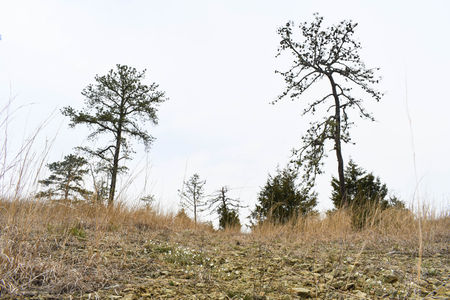Serpentine Barrens: Difference between revisions
Jump to navigation
Jump to search
No edit summary |
No edit summary |
||
| Line 1: | Line 1: | ||
[[File:SBW-1.jpg|right| | [[File:SBW-1.jpg|right|450px|"Goat Hill Serpentine Barrens in SE Pennsylvania. Photo taken by Josh Klostermann"]] | ||
Serpentine Barrens are rare and unique ecoregions that can be found globally in small pockets of land with serpentine [[bedrock]] and [[soil]]. The term "serpentine barren" generally refers to a serpentine outcrop and its associated vegetation. Historically, European settlers associated the word "barren" with landscapes that have little to no timber-sized trees. [ ] | Serpentine Barrens are rare and unique ecoregions that can be found globally in small pockets of land with serpentine [[bedrock]] and [[soil]]. The term "serpentine barren" generally refers to a serpentine outcrop and its associated vegetation. Historically, European settlers associated the word "barren" with landscapes that have little to no timber-sized trees. [ ] | ||
Revision as of 10:34, 2 May 2021

Serpentine Barrens are rare and unique ecoregions that can be found globally in small pockets of land with serpentine bedrock and soil. The term "serpentine barren" generally refers to a serpentine outcrop and its associated vegetation. Historically, European settlers associated the word "barren" with landscapes that have little to no timber-sized trees. [ ]
Soil formation: sea rock uplifted to crust. Ultra Mafic.
Evolution and soil edaphism:
East Coast Serpentine Barrens: Add map of barrens. Briefly describe history + formation
Flora: Photos reel of plants. Plant list.
Threats and Restoration Efforts: Invasive species, hydrology, fire
Bioremediation: proxy for restoration ecology bc of high metal content